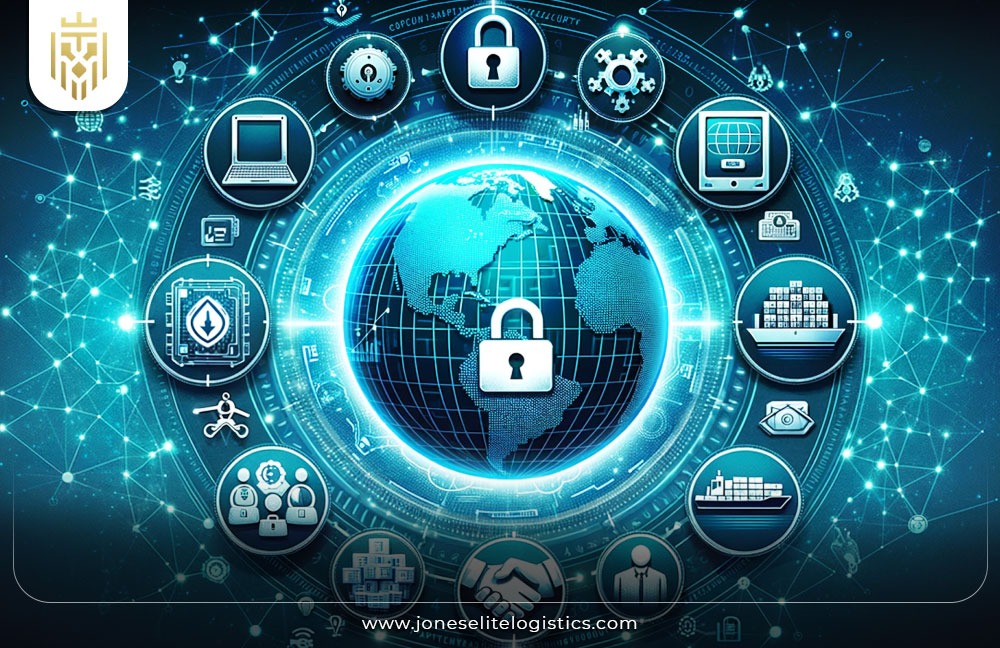What is Supply Chain Security?
Supply chain security is a core sector in supply chain management, where the primary tasks of implementing and maintaining the supply chain are managed regularly. Both physical security and cybersecurity supply chain measures are essential components of supply chain security systems for supply chain software and security devices.
Importance of Supply Chain Security:
Supply chain security is crucial for maintaining business continuity with the core goal of shielding businesses from attacks, such as malware attacks and data leaks. It plays an important role in protecting against potential disruptions, preventing unnecessary costs, and ensuring businesses only collaborate with verified external organizations, thereby enhancing supply chain security across global supply operations.

How does Supply Chain Security Work:
Supply chain security involves proactive risk management strategies, including monitoring, verifying suppliers, and implementing cybersecurity supply chain protocols to protect against threats like counterfeiting, theft, and cyber-attacks. These measures ensure the integrity, safety, and resilience of supply chains from end to end.
Supply Chain Security Threats:
A Supply chain security system can be found under attack numerous times, which need to be regularly tackled to safeguard the global supply chain, and they include:
Implanted Back doors:
Implanted back doors refer to hidden access points in software or hardware that can be exploited by attackers, as they distract the cybersecurity supply chain with a random malware attack. Stringent measures to detect untrusted software and ensuring host firewall protection can prevent these sneaky attempts to breach supply chain security.

Extensive third-party access rights:
Extensive third-party access rights increase the supply chain risk of unauthorized access to sensitive supply chain data. Businesses can set up measures to verify their partner’s certifications and data safeguarding methods, and perform other third-party risk management assessments.
Lack of visibility over third parties:
Limited transparency in third-party relationships impedes effective risk management, making it difficult to detect issues like compliance violations, supply chain security breaches, or disruptions. This gap can lead to unforeseen vulnerabilities, undetected compliance violations, and cybersecurity breaches, increasing supply chain risk.
Poor data management:
Poor data management can lead to security breaches and inefficiencies within the supply chain, delivering inaccurate data and causing panic. Companies need to ensure the secure use, storage, and protection of their invaluable data, maintaining the cybersecurity supply chain for continuous operations.
Importance of Global Supply Chain Security:
Global supply chain security is vital for ensuring businesses are conducted smoothly without any loss for those involved. The data collected through secure systems guides decision-making, helping to safeguard international trade and maintaining economic stability within the global supply chain. Effective supply chain security also addresses growing security concerns in global trade environments.

How to Reduce Supply Chain Security Risks:
Reducing supply chain security risks involves implementing strategies to mitigate vulnerabilities and enhance resilience, and they include:
Managing Third-Party Risk:
Managing third-party risk involves continuous assessment and monitoring of supply chain partners’ security practices to mitigate potential vulnerabilities. This proactive approach helps in identifying risks early and ensuring compliance across the supply chain.
Setting Up Controls and Enhancing Visibility:
Establishing robust controls and improving visibility strengthens oversight, reducing the chances of disruptions and ensuring a secure supply chain. These measures also facilitate quicker response times to any emerging threats within the cybersecurity supply chain.
Detecting and Securing Data:
Effective data detection and security measures protect sensitive information within the supply chain from breaches, ensuring confidentiality and integrity. Regular audits, encryption, and advanced security devices are key to maintaining data security and supporting the overall supply chain security system.
Implementing Controls and Ensuring Visibility:
Implementing stringent controls and ensuring transparency are crucial for preventing and addressing potential supply chain security threats. Enhanced visibility allows for real-time monitoring and swift action against any anomalies, thereby securing global supply chains from potential risks.
FAQs
1)What is Supply Chain Security?
Supply chain security is a core sector in supply chain management, where the primary tasks of implementing and maintaining the supply chain are managed regularly. Both physical security and cybersecurity supply chain measures makeup the two core components for supply chain software and security devices.
2) How does Supply Chain Security Work?
Supply chain security involves proactive risk management strategies, including monitoring, verifying suppliers, and implementing cybersecurity supply chain protocols to protect against threats like counterfeiting, theft, and cyber-attacks. These measures ensure the integrity, safety, and resilience of supply chains from end to end.
3) What is the Importance of Supply Chain Security?
Global supply chain security is vital for ensuring businesses are conducted smoothly without any losses for those involved, as the data collected guides them towards the next step. It helps with safeguarding international trade, maintaining economic stability, and reducing supply chain risks.
4) What are Supply Chain Security Threats?
The threats are: Implanted Back Doors, Extensive Third-Party Access Rights, Lack of Visibility over Third Parties, and Poor Data Management.







